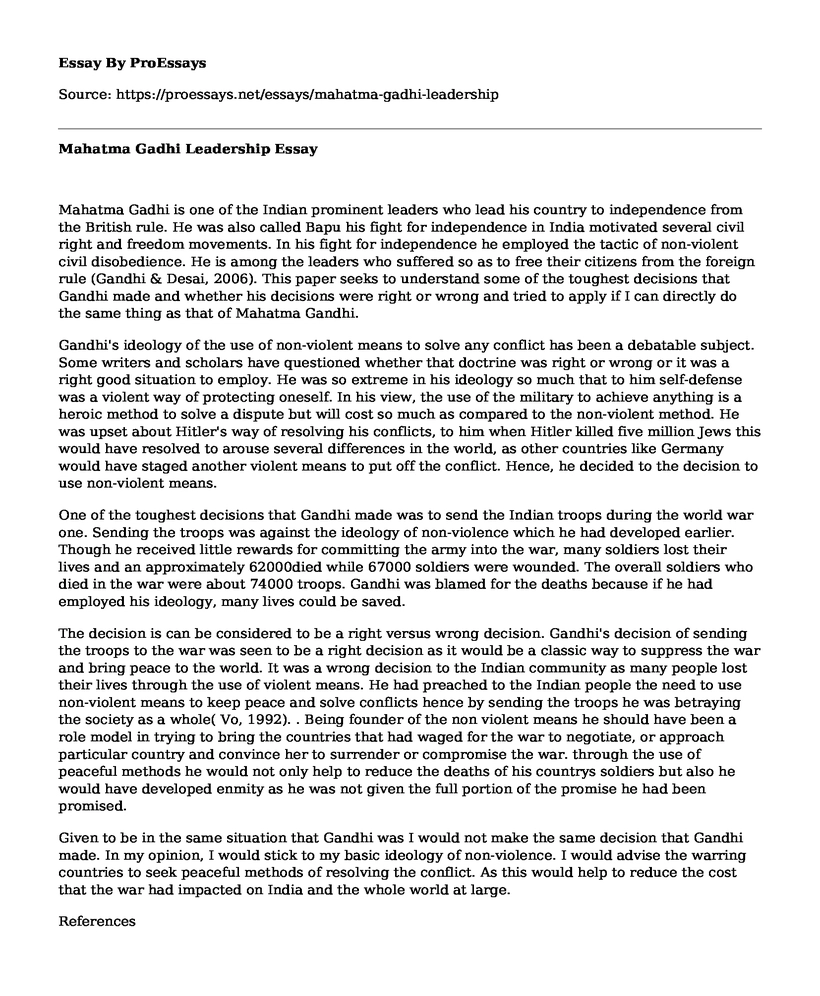Mahatma Gadhi is one of the Indian prominent leaders who lead his country to independence from the British rule. He was also called Bapu his fight for independence in India motivated several civil right and freedom movements. In his fight for independence he employed the tactic of non-violent civil disobedience. He is among the leaders who suffered so as to free their citizens from the foreign rule (Gandhi & Desai, 2006). This paper seeks to understand some of the toughest decisions that Gandhi made and whether his decisions were right or wrong and tried to apply if I can directly do the same thing as that of Mahatma Gandhi.
Gandhi's ideology of the use of non-violent means to solve any conflict has been a debatable subject. Some writers and scholars have questioned whether that doctrine was right or wrong or it was a right good situation to employ. He was so extreme in his ideology so much that to him self-defense was a violent way of protecting oneself. In his view, the use of the military to achieve anything is a heroic method to solve a dispute but will cost so much as compared to the non-violent method. He was upset about Hitler's way of resolving his conflicts, to him when Hitler killed five million Jews this would have resolved to arouse several differences in the world, as other countries like Germany would have staged another violent means to put off the conflict. Hence, he decided to the decision to use non-violent means.
One of the toughest decisions that Gandhi made was to send the Indian troops during the world war one. Sending the troops was against the ideology of non-violence which he had developed earlier. Though he received little rewards for committing the army into the war, many soldiers lost their lives and an approximately 62000died while 67000 soldiers were wounded. The overall soldiers who died in the war were about 74000 troops. Gandhi was blamed for the deaths because if he had employed his ideology, many lives could be saved.
The decision is can be considered to be a right versus wrong decision. Gandhi's decision of sending the troops to the war was seen to be a right decision as it would be a classic way to suppress the war and bring peace to the world. It was a wrong decision to the Indian community as many people lost their lives through the use of violent means. He had preached to the Indian people the need to use non-violent means to keep peace and solve conflicts hence by sending the troops he was betraying the society as a whole( Vo, 1992). . Being founder of the non violent means he should have been a role model in trying to bring the countries that had waged for the war to negotiate, or approach particular country and convince her to surrender or compromise the war. through the use of peaceful methods he would not only help to reduce the deaths of his countrys soldiers but also he would have developed enmity as he was not given the full portion of the promise he had been promised.
Given to be in the same situation that Gandhi was I would not make the same decision that Gandhi made. In my opinion, I would stick to my basic ideology of non-violence. I would advise the warring countries to seek peaceful methods of resolving the conflict. As this would help to reduce the cost that the war had impacted on India and the whole world at large.
References
Gandhi, M. K., & Desai, M. (2006). An autobiography or the story of my experiments with truth. Ahmedabad: Navajivan Publ. House.
Vo, N. G. (1992). Dien Bien Phu, the most difficult decision and other writings. Hanoi: The Gioi.
Cite this page
Mahatma Gadhi Leadership. (2021, Mar 11). Retrieved from https://proessays.net/essays/mahatma-gadhi-leadership
If you are the original author of this essay and no longer wish to have it published on the ProEssays website, please click below to request its removal:
- Essay Example on Nationalism: The Building Blocks of Modern States
- Essay on Mexico-American War: Cultural Adaptation, Political Discrimination, and Identity Formation
- Essay on Vladimir Lenin: Revolutionary Leader of Soviet Union and Russia (1870-1924)
- Netflix: A People-Oriented Culture for Global Expansion - Essay Sample
- Paper Example on Reasoning & Decision-Making: Exploring Chapter 12 of Galotti (2017)
- US Government Reforms to Affordable Healthcare Act - Free Essay Sample
- Essay Sample on Public Administration: Coordinating Government Activities







